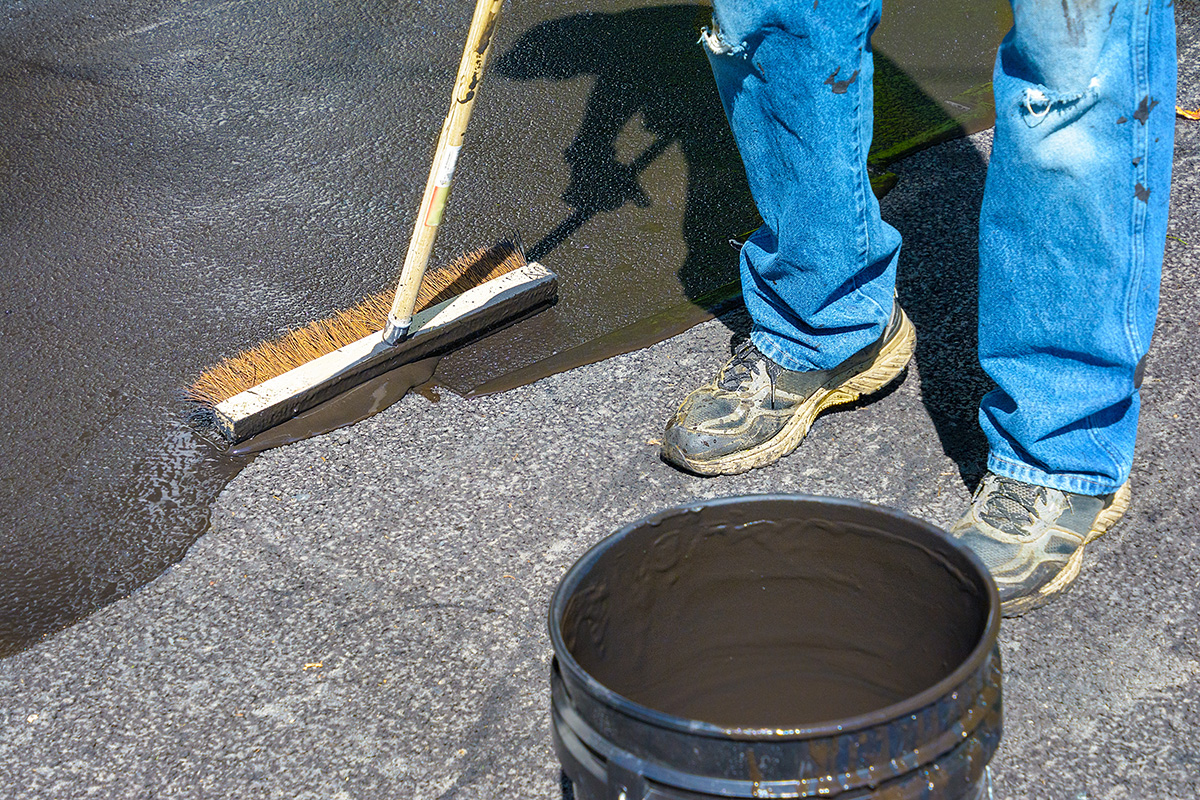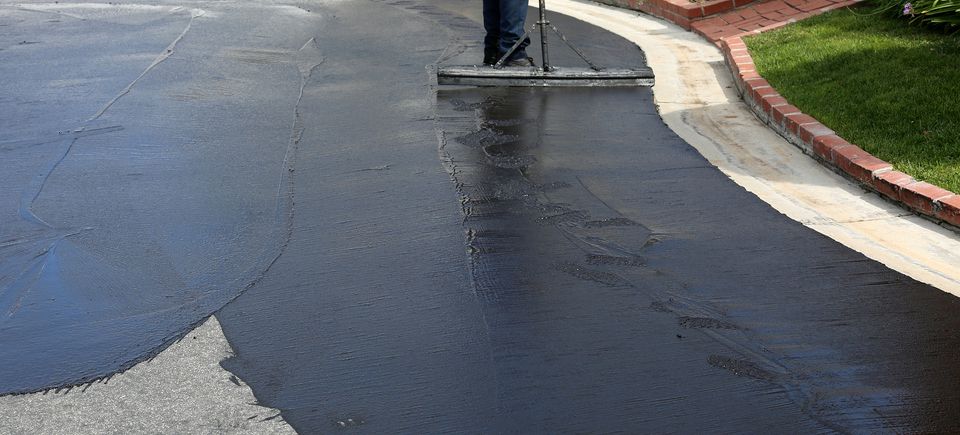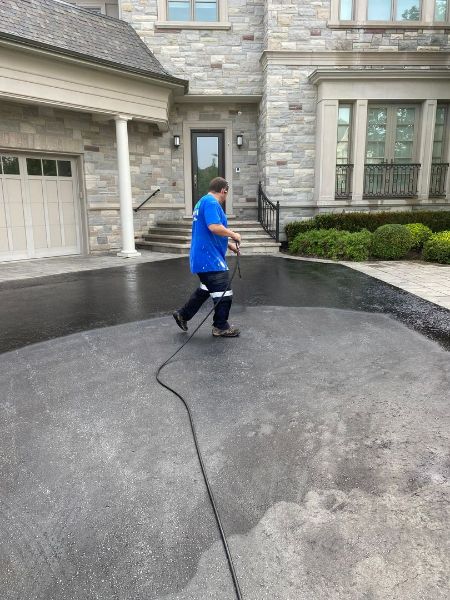Release the Possible: Regrading and Asphalt Sealing for Business Spaces
Release the Possible: Regrading and Asphalt Sealing for Business Spaces
Blog Article
Warm Mix Asphalt: A Lasting Service for Pavement
Warm Mix Asphalt (HMA) has actually emerged as a leading sustainable selection for sidewalk solutions, providing a myriad of cutting-edge modern technologies and environmental benefits. Its capacity to recycle products and minimize power intake presents an engaging situation for its adoption in road construction projects. In addition, the long-lasting efficiency and longevity of HMA make it a favored choice for facilities development. As the demand for environmentally friendly building and construction techniques grows, exploring the nuances of HMA's sustainability can give beneficial insights into the future of sidewalk remedies.
Ecological Advantages of Hot Mix Asphalt

Additionally, Warm Mix Asphalt assists to reduce urban warm island impacts. Its dark shade takes in sunlight, decreasing the amount of warmth showed back right into the ambience compared to lighter-colored sidewalks. This can reduce ambient temperature levels in urban areas, lowering the demand for air conditioning and ultimately reducing energy intake.
On top of that, Warm Mix Asphalt adds to enhanced stormwater monitoring. Its porous nature allows water to infiltrate the sidewalk and recharge groundwater materials, minimizing overflow and the danger of flooding. These ecological benefits make Hot Mix Asphalt a sustainable choice for leading highways and roadways.
Power Efficiency in HMA Manufacturing
Is energy effectiveness an important consider the production of Hot Mix Asphalt (HMA)? Definitely. Energy plays a substantial role in the manufacturing of HMA, affecting both cost and environmental sustainability. One crucial aspect of power performance in HMA production is the usage of cozy mix asphalt (WMA) technologies (regrading). WMA permits for the blending and positioning of asphalt at reduced temperatures contrasted to traditional warm mix asphalt, leading to minimized power consumption during manufacturing. This process not only decreases fuel use however also decreases greenhouse gas exhausts, making it a much more ecologically pleasant option.
Furthermore, improvements in plant technologies have actually caused more energy-efficient HMA production procedures. Modern plants are made with functions like recycled asphalt sidewalk (RAP) handling abilities, reliable heater systems, and improved insulation, all adding to power financial savings. By optimizing power use in HMA manufacturing, the market can minimize its carbon footprint while keeping top quality pavement products. Energy effectiveness is, consequently, a crucial consideration in making sure the sustainability of Warm Mix Asphalt production.
Recyclability of Warm Mix Asphalt
The recyclability of Warm Mix Asphalt (HMA) is a critical element of its sustainability and long-term environmental influence. HMA is one of the most recycled products in the USA, with over 100 million lots of redeemed asphalt pavement (RAP) being recycled each year in new pavement building and construction. Reusing HMA supplies numerous ecological advantages, such as decreasing the requirement for virgin materials, reducing power usage throughout manufacturing, and decreasing the amount of waste sent out to land fills.
The procedure of reusing HMA includes crushing the existing pavement, crushing it right into smaller items, and blending it with new aggregate and asphalt binder to produce a recycled mix. This recycled mix can typically execute in addition to or even far better than standard HMA, while calling for fewer raw products and creating reduced greenhouse gas emissions. By incorporating RAP into brand-new sidewalk jobs, road agencies can conserve natural deposits, reduce prices, and decrease the ecological footprint of road building and upkeep activities. Generally, the recyclability of HMA plays a considerable duty in promoting lasting techniques within the sidewalk sector.

Long-Term Performance of HMA
Asphalt pavements show longevity and resilience over a prolonged duration, reflecting the long-lasting efficiency of Warm Mix Asphalt (HMA) The durability of HMA can be credited to its capability to endure rush hour tons, harsh weather, and the effects of aging. Studies have shown that properly designed and appropriately created HMA sidewalks can last for 20 years or even more with normal maintenance. The secret to making best use of the lasting performance of HMA depends on using top notch products, following ideal techniques in construction, and executing effective maintenance approaches. Appropriate drain, regular examinations, and timely repair work are important for maintaining the architectural integrity of HMA pavements gradually. Furthermore, advancements in HMA modern technology, such as using polymer-modified binders Website and cozy mix asphalt, have better improved the longevity and long life of HMA pavements. By prioritizing top quality construction and maintenance methods, HMA continues to show itself as a sustainable and cost-efficient service for resilient sidewalk framework. visit the site

HMA: Toughness and Sustainability
Showing both sturdiness and sustainability, Hot Mix Asphalt (HMA) has become a foundation in the construction of lasting pavement frameworks - commercial parking lot paving. HMA's toughness originates from its capacity to stand up to hefty tons, rough climate condition, and high website traffic volumes, making it a dependable choice for highways, highways, and airport runways. The composition of HMA, which normally includes aggregates, binder, and filler, plays an essential duty in boosting its longevity and resistance to damage
Moreover, HMA's sustainability depends on its recyclability and energy-efficient production process. The ability to reuse recovered asphalt pavement (RAP) in new HMA mixes reduces the need for virgin products and decreases the ecological impact of sidewalk construction and maintenance. Additionally, the energy efficiency of generating HMA hinges on its reduced mixing temperatures contrasted to other sidewalk products, causing reduced energy consumption and greenhouse gas emissions.
Final Thought
Finally, warm mix asphalt (HMA) uses a sustainable service for pavement with its eco-friendly features. HMA's recyclability, energy effectiveness in manufacturing, and long-lasting longevity make it an eco-friendly option for road building. By conserving natural sources, decreasing waste, and decreasing greenhouse gas emissions, HMA plays a vital role in advertising sustainability in infrastructure development. Its capability to mitigate urban heat island results even more highlights its learn the facts here now importance in developing environmentally conscious and durable pavement systems.
HMA is one of the most recycled products in the United States, with over 100 million tons of recovered asphalt sidewalk (RAP) being recycled every year in new pavement building and construction.The process of recycling HMA involves crushing the existing sidewalk, squashing it into smaller items, and mixing it with brand-new aggregate and asphalt binder to produce a recycled mix.Asphalt sidewalks show longevity and durability over a prolonged duration, showing the long-lasting efficiency of Warm Mix Asphalt (HMA) Additionally, improvements in HMA innovation, such as the use of polymer-modified binders and cozy mix asphalt, have actually even more improved the resilience and long life of HMA sidewalks. The capacity to recycle recovered asphalt sidewalk (RAP) in new HMA mixtures lowers the need for virgin materials and decreases the environmental influence of pavement building and maintenance.
Report this page